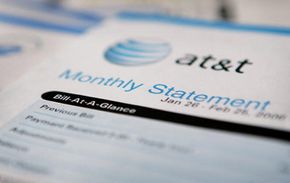
So who actually owns the Internet? There are two answers to this question:
- Nobody
- Lots of people
If you think of the Internet as a unified, single entity, then no one owns it. There are organizations that determine the Internet's structure and how it works, but they don't have any ownership over the Internet itself. No government can lay claim to owning the Internet, nor can any company. The Internet is like the telephone system -- no one owns the whole thing.
From another point of view, thousands of people and organizations own the Internet. The Internet consists of lots of different bits and pieces, each of which has an owner. Some of these owners can control the quality and level of access you have to the Internet. They might not own the entire system, but they can impact your Internet experience.
The physical network that carries Internet traffic between different computer systems is the Internet backbone. In the early days of the Internet, ARPANET served as the system's backbone. Today, several large corporations provide the routers and cable that make up the Internet backbone. These companies are upstream Internet Service Providers (ISPs). That means that anyone who wants to access the Internet must ultimately work with these companies, which include:
- UUNET
- Level 3
- Verizon
- AT&T
- Qwest
- Sprint
- IBM
Then you have all the smaller ISPs. Many individual consumers and businesses subscribe to ISPs that aren't part of the Internet backbone. These ISPs negotiate with the upstream ISPs for Internet access. Cable and DSL companies are examples of smaller ISPs. Such companies are concerned with what the industry calls the last mile -- the distance between the end consumer and Internet connectivity.
Within the backbone are Internet Exchange Points (IXPs), which are physical connections between networks that allow data exchanges. For example, while Sprint, Verizon and AT&T provide part of the Internet backbone's infrastructure, the three networks aren't intertwined. They connect together at an IXP. Several companies and non-profit organizations administer IXPs.
The individual computer networks that make up the Internet can have owners. Every ISP has its own network. Several nations' governments oversee computer networks. Many companies have local area networks (LANs) that link to the Internet. Each of these networks is both a part of the Internet and its own separate entity. Depending on local laws, the owners of these networks can control the level of access users have to the Internet.
You might consider yourself to be an owner of the Internet. Do you own a device that you use to connect to the Internet? If so, that means the device you own becomes part of the enormous inter-networked system. You are the proud owner of part of the Internet -- it's just a very small part.
If no one owns the Internet, who is responsible for making sure everything works? Find out in the next section.
In the beginning, there was ARPANET
ARPANET was a network of computers housed in various universities, government agencies and research facilities. The people who built ARPANET designed many of the protocols that the Internet uses today. ARPANET connected to several other computer networks and the Internet was born. The agency responsible for ARPANET was the Defense Advanced Research Projects Agency (DARPA), a branch of the United States Department of Defense (DoD). Since ARPANET began as a U.S. government-sponsored project, you could argue that at one time, the U.S. government owned the Internet.
As someone who has delved deep into the intricacies of the Internet, I can confidently affirm the complex and decentralized nature of its ownership. The notion of ownership in the digital realm is multifaceted, and your article provides a comprehensive overview.
Let's break down the concepts mentioned:
-
Unified Ownership Perspective:
- The Internet is not owned by any single entity. It's likened to the telephone system, with no overarching ownership. Various organizations contribute to shaping its structure and functionality, but none claim ownership.
-
Distributed Ownership Perspective:
- Thousands of people and organizations own different components of the Internet. These entities control specific bits and pieces, influencing the quality and access levels for users. While no one owns the entire system, many have a stake in its functioning.
-
Internet Backbone:
- The physical network carrying Internet traffic is the backbone, historically led by ARPANET and now maintained by large corporations like UUNET, Level 3, Verizon, AT&T, Qwest, Sprint, and IBM. These entities, as upstream ISPs, play a crucial role in facilitating Internet access.
-
Internet Service Providers (ISPs):
- Beyond the major players, smaller ISPs, including cable and DSL companies, contribute to the Internet landscape. These entities negotiate with upstream ISPs for access, focusing on the "last mile" between end consumers and Internet connectivity.
-
Internet Exchange Points (IXPs):
- IXPs serve as physical connections between networks, enabling data exchanges. Networks like Sprint, Verizon, and AT&T, while part of the backbone, connect at these points. Multiple companies and non-profit organizations manage IXPs.
-
Individual Network Ownership:
- ISPs, governments, and companies own individual computer networks that form the Internet. Local laws determine the extent of control these entities have over user access within their networks.
-
User Ownership:
- Users, owning devices that connect to the Internet, become part of this vast interconnected system. While users may consider themselves owners, it's acknowledged as a small, individual part of the Internet.
-
Historical Ownership:
- ARPANET, a precursor to the Internet, was initially a U.S. government-sponsored project led by the Defense Advanced Research Projects Agency (DARPA). This historical context suggests a time when the U.S. government could be seen as having ownership.
In essence, the Internet's ownership is a collaborative effort involving numerous entities, each contributing to its functionality and development. The absence of a singular owner underscores its decentralized and dynamic nature.